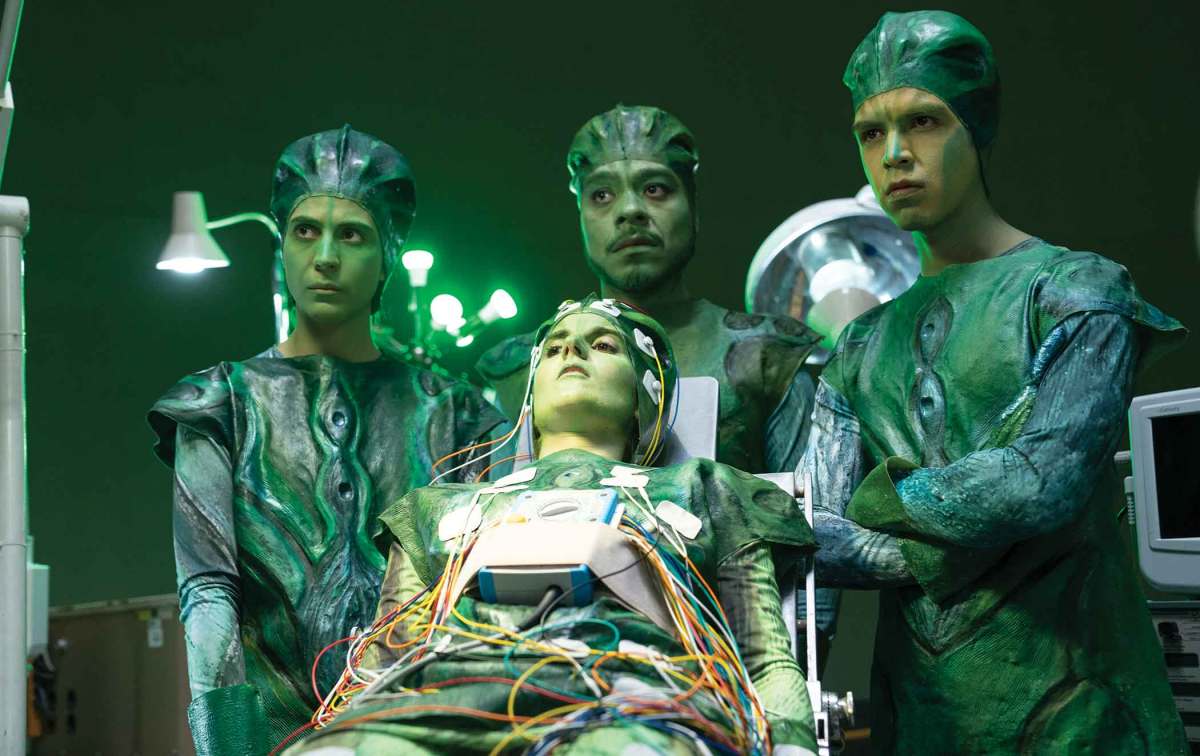The second season of Los Espookys has landed on Binge. The delightfully queer Mexican comedy is a rollercoaster of magical realism and kitschy special-effects. Unlike most horror TV, the monsters you see are not real. If you think that’s a sea monster or an extraterrestrial, it’s down to the hardworking ingenuity of Los Espookys, a troupe of special-effects artists.
The show is structured around the shady hauntings staged by the Espookys inevitably going sideways. It’s a comedy about the gig economy, highlighting the absurd contrasts between the creatives who make our spectacular experiences and the affluent clients who invent wacky problems for themselves. What makes it special is that there are real ghosts, demons, and aliens, but they’re a part of the Espooky’s everyday.
For the characters, spooky is their ordinary. The show is an excellent illustration of ‘queer’ to mean both ‘strange’ and LGBT, flowing ambiguously and fabulously around concrete definitions. The troupe – Renaldo (Bernardo Velasco), Úrsula (Cassandra Ciangherotti), Andrés (Julio Torres), and Tati (Ana Fabrega) – are all some variety of queer (Torres and Fabrega are also showrunners, along with Fred Armisen).
Their queer affinity for the uncanny is a wry twist on turning your identity into your hustle. Can you design a convincing werewolf when you’re haunted by an underwater demon? How do you remember your lines faking an exorcism when you experience all time simultaneously? Can you convince someone they’re trapped in a haunted house when you’re being stalked by pod people? Fortunately, Andrés can talk to the moon now. Go with it.
Haunting
In the first episode of the new season, the Espookys are commissioned to perform as sheet-wearing ghosts who explain why the gravedigger buried them all in the wrong place. This gig goes relatively smoothly, but their personal arcs are getting complicated.
Renaldo, who previously didn’t experience much of the uncanny firsthand, is being haunted by a beauty queen who died under mysterious circumstances. Andrés, forsaken by his wealthy family for dumping his conceited fiancé Juan Carlos, is experiencing the rude shock of proletariat life on Renaldo’s couch.
Read: Taika Waititi’s Our Flag Means Death nails queer representation
Tati’s cheerful delusions continue as she embraces life as Juan Carlos’s trophy wife. Úrsula remains the skeptic of the group: she’s tempted by a queer radical vegan tarot book swap, but the host’s vapidly straight catchphrase ‘love is love’ makes her suspicious.
This scene tells us everything about the difference between a queer show, and a show with queer people in it. HBO has invested in a few quirky and queer little comedies like Los Espookys and Our Flag Means Death. Both of them have a cheap aesthetic that makes them feel indie, despite them belonging to the rapidly-collapsing behemoth Warner Bros corporation.
The shows situate a queer ensemble as the ordinary, without trying for a bland and normative utopia where ‘love is love’: instead, it’s a community of unabashed oddballs are trying to carve out a living for themselves in the margins. It’s one of HBO’s most successful experiments: the show itself, like the characters, is immensely refreshing because it’s so cheerfully bizarre.
Still, Los Espookys must occasionally remind us it belongs to one of Hollywood’s biggest companies. The concession comes as cutaways to co-showrunner Fred Armisen, playing a good-natured valet called Tico. He’s Renaldo’s uncle in America, a flimsy connection to the narrative. It feels more than anything like a way to make the story appealing to wider audiences, but that runs counter to the show’s philosophy of embracing the cultural margins.
Captions
There is one technical detail that highlights the show not just being about Mexican characters but for Mexican characters: its captions. The majority of the show is in Spanish, with English captions, while the occasional Americans speak English with translated Spanish captions hardcoded.
Read: House of the Dragon is too violent – I can’t stomach it
This makes it tricky as a deaf viewer who can’t understand spoken English or written Spanish, but it’s also refreshing to have a show that’s not exclusively repackaging Mexican entertainment through an American context. Los Espookys isn’t interested in being a show for everyone, and it’s much better for it.
While HBO’s flagship shows like House of the Dragon insist that the world of monsters and magic must be innately cruel, Los Espookys undercuts that philosophy marvellously. HBO has its bases covered in that regard: the dragons in Los Espookys might be made of latex and fishing wire, but the show is infinitely more imaginative in how it treats its characters.
In many ways, it feels too good to be true: surely if HBO is to survive the upheaval at Warner it might put all its eggs in its mega-budget flagship basket, not its experimental comedies. It’s a shame, because you have to be a bit weird to be cool, and Los Espookys is deeply, wonderfully weird.
Los Espookys Season 2 is currently streaming on Binge.
Actors:
Director:
Format: Movie
Country:
Release:





